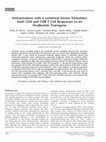Papers by Helen and Richard Rowe

Molecular Therapy, 2006
Lentiviral vectors encoding antigens are promising vaccine candidates because they transduce dend... more Lentiviral vectors encoding antigens are promising vaccine candidates because they transduce dendritic cells (DC) in vivo and prime CTL responses. Here we examine their stimulation of antigenspecific CD4 + T cells, critical for protective immunity against tumors or infectious disease. We constructed lentiviral vectors (lentivectors) expressing ovalbumin, which was secreted (OVA), cytoplasmic (OVAcyt), or fused to either invariant chain (Ii-OVA) or transferrin receptor (TfR-OVA) sequences, targeting the MHC class II presentation pathway. Murine DC infected with the various lentivectors could stimulate OT-I (CD8 + , OVA TCR transgenic) T cells and all except OVAcyt could also stimulate OT-II (CD4 + , OVA TCR transgenic) T cells in vitro. Direct injection of the OVA-, Ii-OVA-, or TfR-OVA-expressing vectors into mice resulted in a CD4 + T cell response, as shown by expansion of adoptively transferred OT-II T cells and upregulation of CD44 on these cells. The Ii-OVA vector was the most potent inducer of IFN-g-secreting CD4 + and CD8 + T cells and was the only vector to protect mice completely from challenge with OVA-expressing tumor cells. Therefore directly injected lentivectors can stimulate CD4 + T cells; both CD4 + and CD8 + responses can be enhanced by targeting the antigen to the MHC class II pathway.











Uploads
Papers by Helen and Richard Rowe